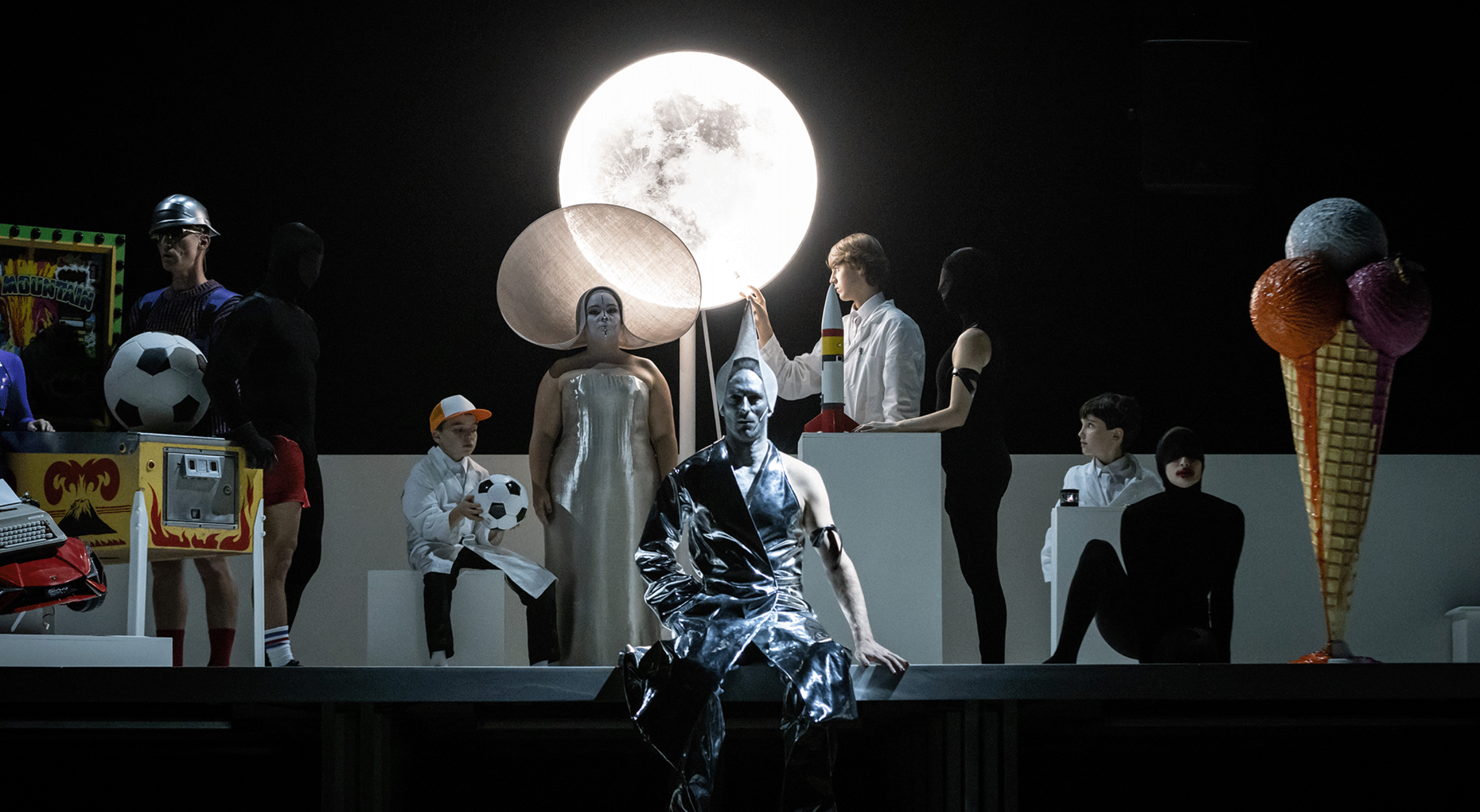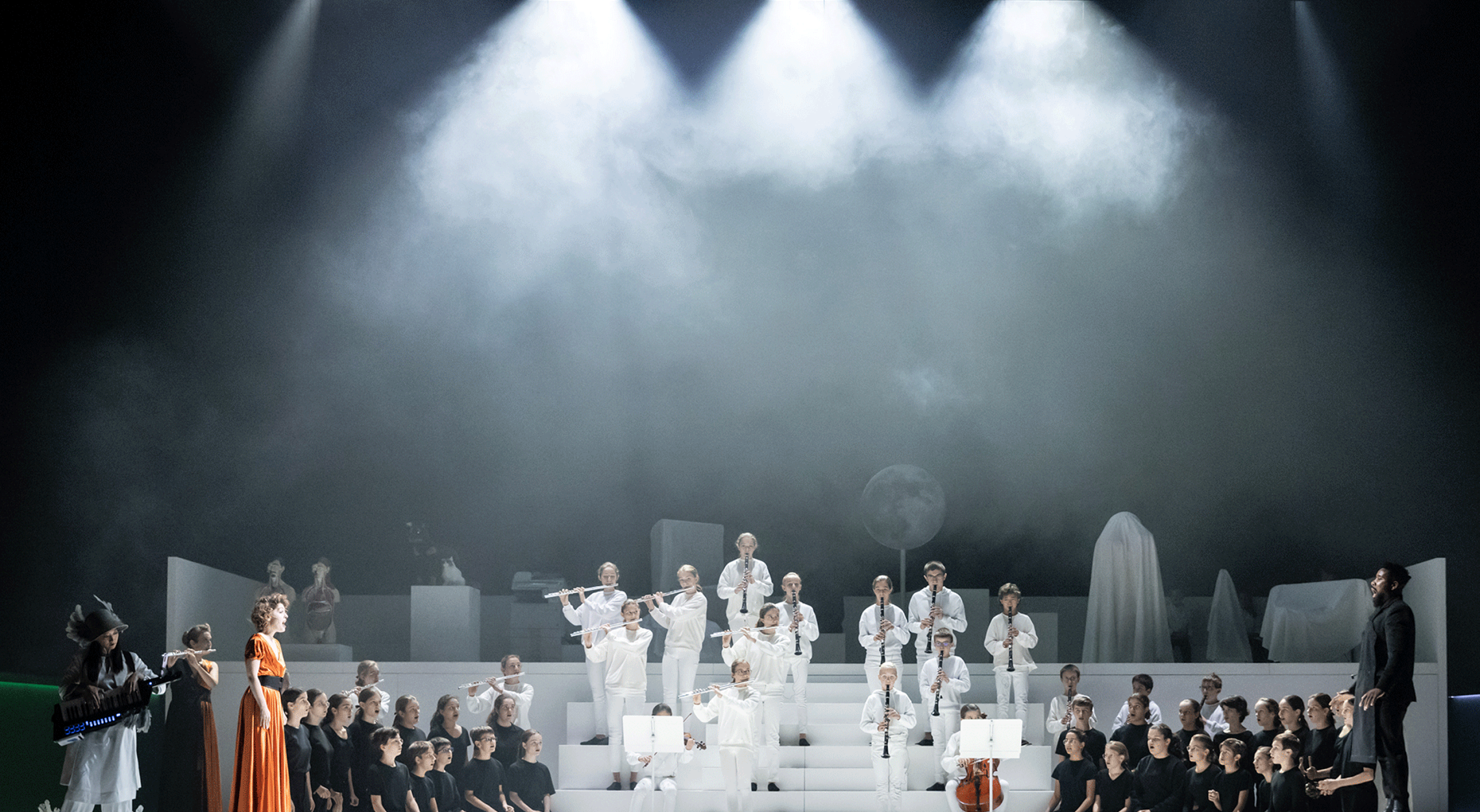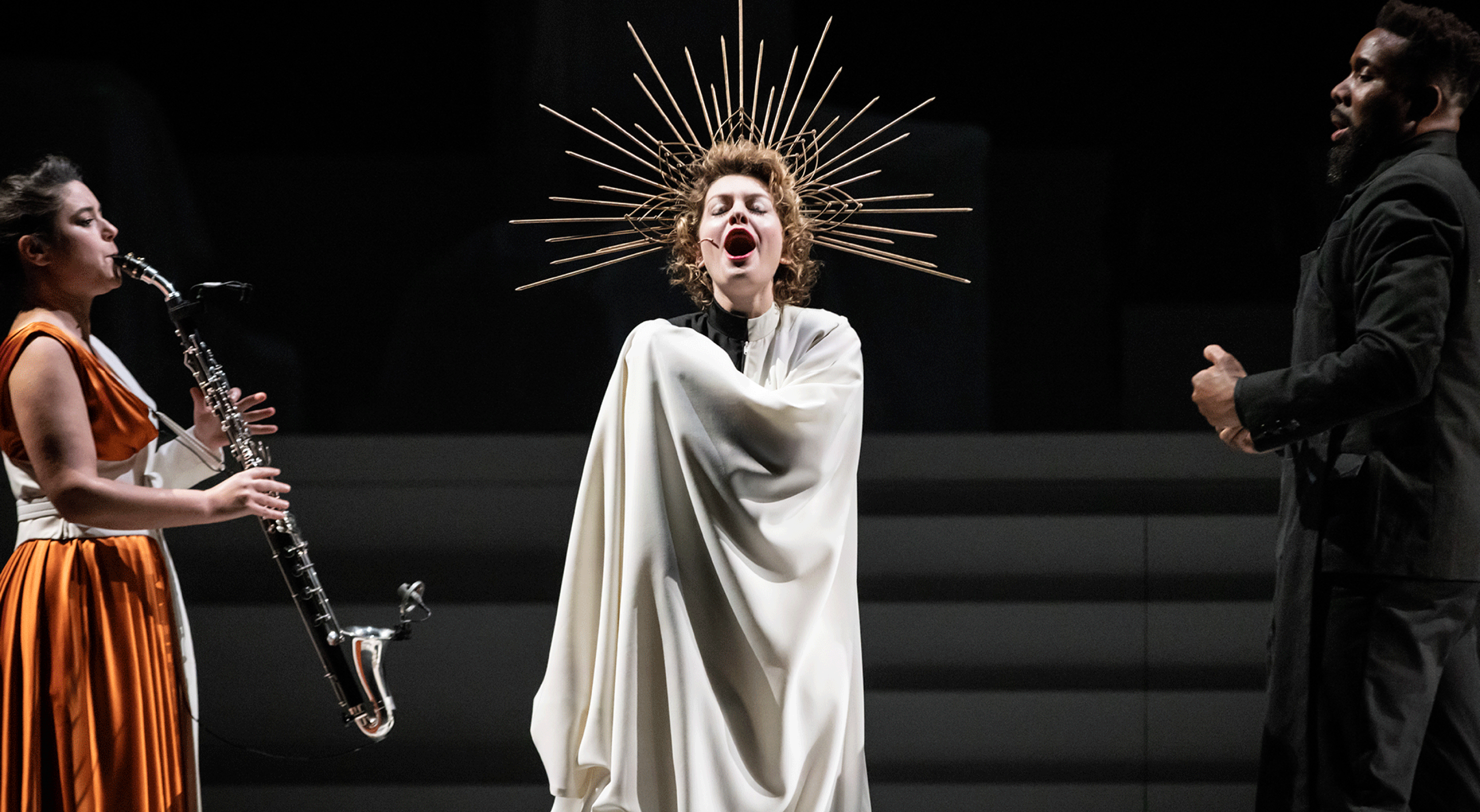Karlheinz Stockhausen
Freitag aus Licht Music, libretto, action, and gestures Karlheinz Stockhausen
Freitag aus Licht (Friday of Light, 1991-1994)
Music: five musicians (soprano, baritone, bass, flute, basset horn), 12 pairs of dancer-mimes (ad libitum), twelve-voice choir, orchestra and children's choir, synthesizer, electronic music with sound scenes, sound diffusion
Publisher: Stockhausen Verlag
First performance: Leipzig, 12 September 1996, Oper Leipzig, under the musical direction of the composer
Commissioned by the Oper Leipzig
Dedicated « to all children »
Le Balcon
Children's orchestra of the Conservatoire à Rayonnement Régional de Lille
Choir of the Maîtrise Notre-Dame de Paris
Musical director, Maxime Pascal
Stage direction and set design, Silvia Costa
Assistant Director, Rosabel Huguet Dueñas
Assistant Stage Designer, Elena Zamparutti
Costumes, Bianca Deigner
assisted by Domitile Guinchard
Lighting design, Bernd Purkrabek
Sound projection, Florent Derex
Musical electronics, Augustin Muller and Étienne Démoulin
HF sound engineer, Baptiste Fesselet
Recording engineer, Martin Antiphon
Children's choir conductor, Émilie Fleury
Singing director, Alain Muller
Realization of the automatons, Plastikart Studio, Istvan Zimmermann, Giovanna Amoroso
Programming of the automatons, Paolo Cavagnolo
Jenny Daviet, soprano - Eva
Iris Zerdoud, basset horn - Elu
Charlotte Bletton, flute - Lufa
Antoin HL Kessel, bass - Ludon
Halidou Nombre, baritone - Caino
Sarah Kim, Haga Ratovo, synthesizer - Synthibird
Singers, Emmanuelle Monier, Pauline Nachman, Marie Picaut, Michiko Takahashi, Léa Trommenschlager, Ayako Yukawa
Singers, Frédéric Albou, Arthur Cady, Bertrand Bontoux, Jean-Christophe Brizard, David Colosio, Florent Martin
Choir of the Maîtrise Notre-Dame de Paris
Arthur Augais Le Blanc, Mathilde Ciet, Sarah Delhaye, Gabrielle Dessay-Gravier, Adrielle Domerg, Georges Durin, Anouck Fdida Gombrowicz, Jean-Pierre Gay Diaz, Sophie Gay Diaz, Madeleine de Giafferi, Apolline Gouton, Marion Kerandel, Marie Kollanur, Anne Kulinski, Margot Lissilour, Chiara Maestracci, Pierre Markoff, Marie Martinez, Bertille Meurin, Lola Morelli-Torchinsky, Constance Petrossian, Émilien Provost, Nina Salbert, Jean Salva, Aurélien Segarra, Éloïse Velasco-Martinez, Nora Vouyoucas, Arthur Wahringer, Inès Yazbek
Children's orchestra of the Conservatoire à Rayonnement Régional de Lille
Flute : Pauline Arnoult, Camille Boyer, Robin Brasme, Syrielle Maes, Chloé Pauchet, Prune Reboul, Ysé Rocheteau, Capucine Roumier
Clarinet : Augustin Aussems, Sarah Bousquet, Alexandre Delorme, Valentin Dumont, Zadig Eliot, Luna Fouquet, Louise Gantois, Marilou Ingargiola, Tristan Meunier, Basile Montet
Cello : Natalia Feltrin
Violin: Jade Gao
Academic advisor, Julien Feltrin
Clarinet teachers, Nathalie Lockner, Eric Perrier
Flute teachers, Aurélie Mallédant, Sandra Mavel
Violin teacher, Sandrine Naudy
Cello teacher, Guillaume Lafeuille
Dance, Rosabel Huguet Dueñas - the arm, Suzanne Meyer - the mouth, Jean-Baptiste Plumeau - the leg
The child actors, Colette Verdier, Marin Rayon, Alexis Mazars, Stéphane Poulet, Edgar Cemin, Arsène Jouet
Directed by Jehanne Carillon
Tenor voice recorded by Damien Bigourdan
With the collaboration of the teams of the Philharmonie de Paris
Produced by Opéra de Lille ; Le Balcon
Création Opéra de Lille le 5 novembre 2022
Co-produced by Philharmonie de Paris – Cité de la Musique; Festival d’Automne à Paris
With the support of the Foundation Singer-Polignac
In partnership with Philharmonie de Paris and Le Balcon, Festival d’Automne presents Friday, another step in its production of the extensive cycle Licht (Light), to which Karlheinz Stockhausen dedicated 25 years of his life. In this piece, music is not just the art of making sound; it makes us aware of the orders in the universe.
The fifth opera in Licht—and the fourth one to be produced—Friday is the day of temptation, of conflict between opposing forces, which are two overarching themes in the cycle: Lucifer, a negating mind, a cantor of multiplicity, going as Ludon; and Eve, Mother of Everything, a cosmic seductress. Lucifer attempts to convince Eve to marry his son, Cain, and join the revolution against Heaven. At first reluctant, she eventually gives in for the sake of humankind. The couple’s children play and laugh in utter joy, supported by Western and African instruments. However, this union is an upset to God, who triggers an atrocious war involving, among others, a winged rhinoceros and a fire breather. Throughout the opera's two acts, strange silhouettes, halfway between humans, animals, and mechanical objects, form twelve couples mimicking sexual intercourse. They spawn hybrid forms: a cat-man, a moon-syringe, a nest-bow, a typewriter-car... Eventually, these creatures fuse together into a great fire spiral. With fantasy imagery borrowed from the Genesis and The Urantia Book, Stockhausen produces luxurious, all-encompassing electronic music, of which he is one of the greatest masters.
See also


